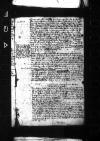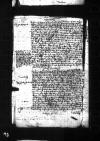Wir habenn E(wer) H(erlichkei)t czwiers ⌊⌋ f... illegible⌈...... illegible⌉ nacheinander hidden by binding⌈[r]r hidden by binding⌉ an uns ausgangenn erhaltenn / und dersulbenn meinung daraus genugsam written over nn⌈nnmm written over nn⌉ eingenomenn. / Bodanckenn uns freuntlich kegen E(wer) H(erlichkei)t, / das die uns auch, / wie von dem edlenn, ernvhesten hern ⌊Johan von Werden⌋ zuvor weitleufig on the margin⌈weitleufigweitleufig on the margin⌉ geschen, / in bowuster handlung mit ⌊f(urstlicher) d(urchlauch)t⌋ borichtet, hat unser anbringen auch und erpitten kegen diesulbenn fleisig anbrocht und ausgerichtet hat. Wir wissen nu gewisse, das sich ⌊f(urstlich)e d(urchlauch)t⌋ kegen Crako gefurdert ist, und sich on the margin⌈kegen ⌊Crako⌋ gefurdert ist, und sichkegen Crako gefurdert ist, und sich on the margin⌉ kurtzlich auf den zug zum superinscribed in place of crossed-out nach Crakow zum⌈nach Crakow zum zum zum superinscribed in place of crossed-out nach Crakow zum⌉ koninglichenn bogrobnus erheben wirt, / wo hin wornoch sich auch die ⌊hern dieser lande rethe⌋ billich richtenn solten, / dieweil man ein iderenn in sunderheit dahin boruffenn. / Vor unser person theten wir nichts liebers, / wo solchs in unserm vormugen were, / und wir die reise unsers gebrechens halben kundten austhen, / den das wir uns dahin begebenn, / und unserm g ⌊allergenedigsten hidden by binding⌈[n]n hidden by binding⌉ hernn⌋ / die letzste trew und dinstparkeit bei seinem bogrobnus hidden by binding⌈[us]us hidden by binding⌉ erzeigtenn. / Mussen aber dis alles Got dem almechtigen ih(?)[...] hidden by binding⌈[...][...] hidden by binding⌉ heim(?) stellen, / und solche(n) notigen zug E(wer) H(erlichkei)t und den ande hidden by binding⌈[e]e hidden by binding⌉renn hernn on the margin⌈hernnhernn on the margin⌉, / die starcker darzu superinscribed⌈darzudarzu superinscribed⌉ geschickter, / auch junger den wir seindt, bovelenn, / des vorhoffens, ess werde ein ider bei sich boge bodencken, was uns allen superinscribed⌈allenallen superinscribed⌉ daran superinscribed in place of crossed-out hiran⌈hiran daran daran superinscribed in place of crossed-out hiran⌉ gelegen, / und wie hoch von noten ess sei, on the margin in place of crossed-out den ess hoch notig ... sein wirdt⌈den ess hoch superinscribed in place of crossed-out sei⌈sei hoch hoch superinscribed in place of crossed-out sei⌉ notig ... illegible⌈...... illegible⌉ sein wirdt hoch von noten ess sei, hoch von noten ess sei, on the margin in place of crossed-out den ess hoch notig ... sein wirdt⌉ / das it diese auf die zeit die ⌊junge ko(ningliche) m(ajeste)t⌋ und die hernn in der Kronn on the margin⌈und die hernn in der Kronnund die hernn in der Kronn on the margin⌉ vor hidden by binding⌈[r]r hidden by binding⌉ erhaltung unser privilegien und freiheit ersucht werde. /  AAWO, AB, D. 70, f. 372r (t.p.) Ess were aber sher nutzlich, das zuvor eher den sich die ⌊hernn redte⌋ dahin bogebenn / ein zusamen kom(m)en under uns on the margin⌈under unsunder uns on the margin⌉ gehalten wurde. / Vorshen uns auch, das man vor der zeit uns alhie ein tagfarth wirdt ansetzen, / derweg derhalbenn wir den an kon(n)inglichen hof geschribenn / und durch eigenen bothen geschribenn, / des widderkunft wir uns teglich vorhoffen. Was der wirdt hievon und sunst von zeitungen / uns wirdt einbringenn, / wollen wir alsdan E(wer) H(erlichkei)t nicht vorhaltenn. Das auch E(wer) H(erlichkei)t in ihrem schreiben anzeigt, / wie die grossen stedte umb zerung zu dem zuge vormanen sollenn, / wil uns nicht wol geburenn. / Schicket sich auch nicht, / weil man die ⌊hernn redte⌋ nicht semptlich, / sunder ein ider in sunderheit gefurdert, / derwegen den ein itzlicher von sich zi wirdt zihen und mit czerung sich superinscribed⌈sichsich superinscribed⌉ vorshenn mussenn. / Hette man uns aber zusamen gefurdert, / mogte so mochte E(wer) H(erlichkei)t meinung nachgesetzet werdenn. Nichts wenigers vorhoffen wir uns viel, was zu diesen sachen allen dinen wirdt durch unsern bothen zuerfharen, / darnach man sich wir uns z alle werden haben zurichten, / das wir auch zeitig genug E(wer) H(erlichkei)t on the margin⌈Nichts wenigers vorhoffen wir uns viel, was zu diesen sachen allen dinen wirdt durch unsern bothen zuerfharen, / darnach man sich wir uns z alle werden haben zurichten, / das wir auch zeitig genug E(wer) H(erlichkei)tNichts wenigers vorhoffen wir uns viel, was zu diesen sachen allen dinen wirdt durch unsern bothen zuerfharen, / darnach man sich wir uns z alle werden haben zurichten, / das wir auch zeitig genug E(wer) H(erlichkei)t on the margin⌉, die wir hiemit gotlichen genaden mit langweriger gesuntheit bovelen, wollen lassen wissen. adscribed⌈wollen lassen wissen.wollen lassen wissen. adscribed⌉
AAWO, AB, D. 70, f. 372r (t.p.) Ess were aber sher nutzlich, das zuvor eher den sich die ⌊hernn redte⌋ dahin bogebenn / ein zusamen kom(m)en under uns on the margin⌈under unsunder uns on the margin⌉ gehalten wurde. / Vorshen uns auch, das man vor der zeit uns alhie ein tagfarth wirdt ansetzen, / derweg derhalbenn wir den an kon(n)inglichen hof geschribenn / und durch eigenen bothen geschribenn, / des widderkunft wir uns teglich vorhoffen. Was der wirdt hievon und sunst von zeitungen / uns wirdt einbringenn, / wollen wir alsdan E(wer) H(erlichkei)t nicht vorhaltenn. Das auch E(wer) H(erlichkei)t in ihrem schreiben anzeigt, / wie die grossen stedte umb zerung zu dem zuge vormanen sollenn, / wil uns nicht wol geburenn. / Schicket sich auch nicht, / weil man die ⌊hernn redte⌋ nicht semptlich, / sunder ein ider in sunderheit gefurdert, / derwegen den ein itzlicher von sich zi wirdt zihen und mit czerung sich superinscribed⌈sichsich superinscribed⌉ vorshenn mussenn. / Hette man uns aber zusamen gefurdert, / mogte so mochte E(wer) H(erlichkei)t meinung nachgesetzet werdenn. Nichts wenigers vorhoffen wir uns viel, was zu diesen sachen allen dinen wirdt durch unsern bothen zuerfharen, / darnach man sich wir uns z alle werden haben zurichten, / das wir auch zeitig genug E(wer) H(erlichkei)t on the margin⌈Nichts wenigers vorhoffen wir uns viel, was zu diesen sachen allen dinen wirdt durch unsern bothen zuerfharen, / darnach man sich wir uns z alle werden haben zurichten, / das wir auch zeitig genug E(wer) H(erlichkei)tNichts wenigers vorhoffen wir uns viel, was zu diesen sachen allen dinen wirdt durch unsern bothen zuerfharen, / darnach man sich wir uns z alle werden haben zurichten, / das wir auch zeitig genug E(wer) H(erlichkei)t on the margin⌉, die wir hiemit gotlichen genaden mit langweriger gesuntheit bovelen, wollen lassen wissen. adscribed⌈wollen lassen wissen.wollen lassen wissen. adscribed⌉
 AAWO, AB, D. 70, f. 372v (b.p.)
AAWO, AB, D. 70, f. 372v (b.p.)  AAWO, AB, D. 70, f. 372r (t.p.) Ess were aber sher nutzlich, das zuvor eher den sich die
AAWO, AB, D. 70, f. 372r (t.p.) Ess were aber sher nutzlich, das zuvor eher den sich die 
